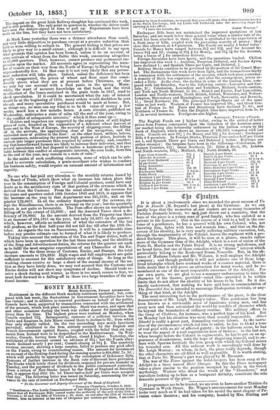Chntyto .
It is about a twelvemonth since we recorded the great success of Un Fits de Fatnille (M. Bayard's last piece) at the Gymnase. As we can hardly hope that the memoriea og,otur readers are so many treasuries of Parisian dramatic history, we npiazjust throw out a reminder, that the hero of the piece is a young man of ,good family, who has enlisted as a private in the Lancers ; that in the course of a visit to a ball in the cos- tume of a gentleman, he has a quarrel with his own Colonel, who, not knowing him, fights with him and wounds him ; and that on the dis- covery of his identity, he is very nearly suffering military execution, but, through the magnanimity of the Colonel, leaves the regiment with a pre- dated discharge. This piece, it will be seen at a glance, smacks rather more of the Gymnase than of the Adelphi, which is a sort of union of tho Porte St. Martin and the Palais Royal. It is no strong melodrama, and no broad farce, but one of those comedies with a " drama " interest which particularly belong to the Boulevard Bonne Nouvelle. But, in the ab- sence of Madame Celeste and Mr. Webster, it well employs the Adelphi company ; and though probably it will not achieve one of those lone- lived triumphs which have crowned works of a coarser material, there is little doubt that it will prove an attraction for many weeks, and be re- membered as one of the most respectable successes of the Adelphi. For our own parts, we are glad to see a manager endeavouring to raise the character of his theatre, provided—mind this—provided it be within limits that do not allow the identity of his house to be lost. Be it dis- tinctly understood, that nothing we have said here in commendation of The Discarded Son is intended to encourage Shaksperian revivals, or any- thing of that kind, at the Adelphi. The most interesting fact in the performance of the piece, is the clear demonstration of Mr. Leigh Murray's value. This gentleman has long been known as a serviceable actor of handsome young men, and has every now and then astonished the world by touches of character which lie beyond the boundaries of ordinary routine. His military officer in the Camp at Chobleant, for instance, was a perfect type of his kind. But on Monday last his situation was more than usually responsible. Albert Mendel is really a great part, demanding various talents. In the narra- tive of the circumstances which led him to enlist, he has to blind a tone of real grief with an air of affected gayety ; in the ballroom scene, he has to wear the aspect of a cool supercilious man of fashion ; in the last act, when brought before the Colonel in regimentals, he has to put on an ap- pearance of drunkenness, with the hope of disguising himself, and to en- dure with Spartan fortitude the iron grasp with which the Colonel seizes his wounded arm. All this arduous work is exceedingly well done by Mr. Leigh Murray; on whom, in fact, the piece really depends, though the other characters are all filled as well as possible. It is worth stating, that at Paris Mr. Murray's part was played by M. Bressant. The war of the Times against the hotel-keepers has been sung at the Adelphi in a farce named Hotel (Urges. In this the Times newspaper takes a place similar to the position occupied by Apollo in the Greek mythology. Waiters who dread the wrath of the " Thunderer," and travellers looking up to him as a benignant divinity, constitute the sole dramatis persome of the piece.


























 Previous page
Previous page